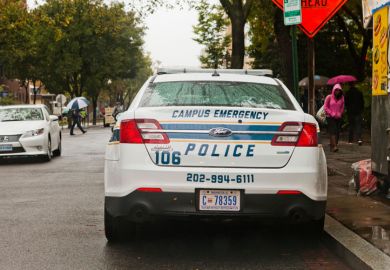Even after a year of heightened attention, following the killing of George Floyd, there has been little change to the problems associated with campus police, with institutions largely batting off demands for meaningful overhaul, say professors.
Dozens of US colleges and universities have faced calls from their students and others to end armed patrols by campus or local police in the aftermath of Mr Floyd’s death in May 2020.
The calls expanded and amplified complaints that had been heard for years, often containing racial dimensions, as campus police forces have mushroomed across the country despite showing little, if any, net benefit.
“By whatever measure one chooses,” the American Association of University Professors (AAUP) said in an assessment of the topic earlier this year, “campus police have not made campuses safer”.
The AAUP compiled a list of unjustified violent incidents in recent years, involving campus police pulling weapons on, illegally detaining or shooting suspects, often black men from within their institution or beyond it.
At Portland State University, for example, students and faculty are still waiting for promised changes after campus police killed a black man, Jason Washington, while he was trying to break up a bar fight in 2018.
There and around the country, “there has been a lot of protest and demands, and some symbolic responses, without a whole lot of meaningful change”, said Megan Horst, an associate professor of urban studies and planning at Portland State and lead author of the AAUP report.
Portland State leaders, Professor Horst said, have devoted much effort to a “Re-Imagine Safety” committee that appears to have “met for many hours, drained the enthusiasm of many smart and passionate people, and led to no actions so far. Maybe some significant actions are coming; we’ll see.”
Victories elsewhere appear limited. More than 90 per cent of US public colleges and universities, and more than a third of private institutions, still employ armed campus officers, according to federal statistics.
Cities such as Los Angeles and Portland have moved ahead with cutting the budgets of their police forces since Mr Floyd’s killing and redirecting money to unarmed community-centred alternatives.
But it should be higher education leading with such innovations, said Davarian Baldwin, a professor of American studies at Connecticut’s Trinity College who has been critical of how US universities treat their surrounding neighbourhoods.
The complicated reasons for their failures, Professor Baldwin said, include the desire of campus administrators to present students and families with an image of security. “The current policing system is meant to keep at bay the world beyond the campus − in most cases a largely non-white world that really poses no threat,” he said.
The lead association of campus police, the International Association of Campus Law Enforcement Administrators, in its own recognition of the Floyd anniversary, acknowledged the challenges its members face.
“We must continue to look inward at ourselves, listen to those around us and make the needed changes to make policing safer for our communities,” the campus policing association’s president, Eric Heath, said in the commemoration.
Professor Baldwin described the problem as a fundamental misunderstanding of the needs on college campuses. Fears of rape and drug-related crime are leading drivers of the sense that campus police are necessary, he said, even though most of that “is student-on-student and largely white-on-white”.
“We maintain the almost complete disconnect,” Professor Baldwin added, “between actual public safety needs and the current function of campus police to protect the university image.”
POSTSCRIPT:
Print headline: ‘Cops haven’t made campuses safer’
Register to continue
Why register?
- Registration is free and only takes a moment
- Once registered, you can read 3 articles a month
- Sign up for our newsletter
Subscribe
Or subscribe for unlimited access to:
- Unlimited access to news, views, insights & reviews
- Digital editions
- Digital access to THE’s university and college rankings analysis
Already registered or a current subscriber?







